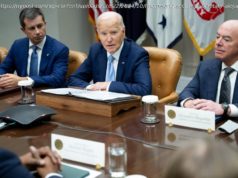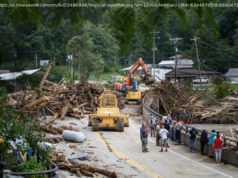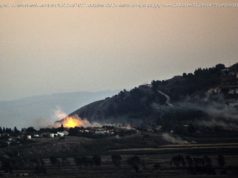Narendra Modi and Donald Trump have used anti-immigration rhetoric to divide voters on national identity.
The outcome of India’s general election may help determine a central question at the heart of the contest – what does it mean to be Indian? Prime Minister Modi and his BJP party, like US President Donald Trump, have focused on borders to shape a particular vision of India’s future.
Shanti Chandri has lived in the small, impoverished village of Dimilapar, outside Assam’s capital city of Guwahati, for half a century.
The diminutive 79-year-old says she fears her 50 years as a resident will be erased after the state publishes its updated National Registry of Citizens (NRC), a census created in 1951 to determine who was born in India and who might be a migrant from the neighbouring, Muslim-majority East Pakistan, now known as Bangladesh.
The census, conducted only in the north-eastern state of Assam, counts citizens who can prove they were residents of India before 24 March, 1971, a day before Bangladesh declared its independence from Pakistan.
Families are required to provide documentation to show their lineage, and those who cannot prove their citizenship are deemed illegal. But the process has been fraught, with some families unable to produce documents due to poor record-keeping, illiteracy or because they lack the money to file a legal claim.
Shanti and her son Vinay, Hindus from the Bengali-speaking minority, were among those left off the NRC draft issued last year. Why Shanti’s elder son, Paritush, was included on the list is unclear.
Vinay, a 30-year-old day labourer, was overwhelmed by the 50,000 rupees ($715; £560) needed to fight his case in court. He was among many in the village who feared being placed in detention centres where hundreds of residents suspected of living in Assam illegally have been held.
NRC officials have also begun holding « foreigner tribunals » to hear contested cases – much like the immigration court hearings under President Donald Trump at the US-Mexico border – while the draft list is being finalised to meet a 31 July deadline mandated by the Supreme Court.
In total some four million people who thought they were Indian were excluded from the draft list. Half of these people have filed claims to be included in the final census.
Vinay could not handle the stress of the uncertainty, Shanti says, and took his own life in May 2018. As she mourns her son, Shanti now worries about her own status if she is left off the finalised list.
« Where shall I go and why should I flee? » she says. « It would be better that I too should die. Nobody is helping us. We are poor and weak people. The government should help us. » The citizenship question
Mr Modi’s Hindu nationalist Bharatiya Janata Party (BJP) has long railed against illegal immigration in India but has made the NRC a priority in recent years.
Local officials say the list has nothing to do with religion, but activists see it as targeting the state’s Bengali community, a large portion of whom are Muslims. Their fears are set against rhetoric from a Hindu nationalist government whose leader has not hidden his preference for Hindu migrants over Muslim ones.
However significant numbers of Bengali-speaking Hindus have also been left off the citizenship list, underscoring the communal and ethnic tensions in the state. For local Assamese, the NRC is about deporting all illegal immigrants – not just one religious minority – in an effort to preserve their culture.
The question of identity is one echoed 13,000km (8,000 miles) away in the US, where a similar resurgence of nationalism has emerged under Mr Trump, the Republican president whose inflammatory rhetoric has stoked anti-immigration fears along the US-Mexico border and divided Americans on national identity.
« While Trump is building his physical wall, Modi is creating a figurative one through policies like the NRC, » says Milan Vaishnav, director of the South Asia programme at the Carnegie Endowment for International Peace.






